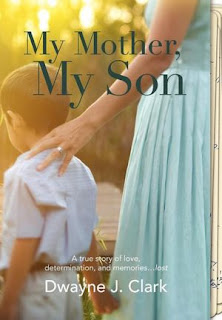Unfortunately,
as anyone who has a family member suffering from dementia or Alzheimer’s
already knows, things only get worse tomorrow.
The disease’s progress is entirely predictable, and there is no way to undo
the damage already done or bring back the memories already lost. And the clock is relentlessly ticking away.
If
anyone should know this, it is Dwayne Clark, the author of My Mother, My Son, a touching memoir in which he shares what it was
like to see his mother snatched from her family one memory at a time. But Clark, the founder and chief executive
officer of Aegis Living, a man with over 25 years experience in the senior
housing field, was caught as unprepared for what was happening to his mother as
any of us are likely to be.
My Mother, My Son is part biography, part
memoir, and the devotion between Clark and his mother is obvious early on in
the book. Clark recognizes how sufferers
of major illness end up being defined by those illnesses. This is particularly true with an illness
like dementia that robs a person of the very memories that define them even to
themselves. It happens so gradually that
the rest of us tend to “overlook the richness of experience and personality
that underlies a person…their life, their contributions.” Clark does not want this to happen to his
mother.
 |
| Dwayne J. Clark |
By
alternating chapters pertaining to his childhood or to his mother’s younger
days with chapters describing her life after being stricken by dementia, Clark
has found just the blend to achieve that goal.
And what a life his mother had: born in India before the breakup of the
British Empire, she lived a life of privilege there before her father’s sudden
death left the family struggling for financial survival. Mary Colleen Callahan married an American
serviceman and immigrated to America, only to see her marriage fall apart. For the rest of her life, she would work hard
at whatever jobs she could get in order to support her children – something
Dwayne, her youngest, would never forget.
My Mother, My Son is the story of a son’s
love for his mother, one that reminds me very much of a similar memoir I read a
few weeks ago, Richard Russo’s Elsewhere. Both men spent their formative years in
households alone with rather demanding single mothers, and experienced similar
issues and relationships with their mothers as adults. Both are eternally devoted to their mothers.
Clarke
closes his memoir with advice he received while coping with his mother’s
illness (his mother died at age 87 after having had dementia for almost ten
percent of her life). As my wife and I
go through a similar situation with a loved one, we find these bits to be
particularly comforting:
· “Understand from the
outset that things will never improve.”
· “This may well be the
most difficult thing you ever do.”
· “Try not to feel guilty.
None of this is your fault.”
· “Sometimes, with the
afflicted person, comfort is the only victory.”
· “This time will pass and
you will have the memory of how you responded to the challenge.”

No comments:
Post a Comment
I always love hearing from you guys...that's what keeps me book-blogging. Thanks for stopping by.